Unit 9 It’s going to rain, isn’t it? 课件
文档属性
| 名称 | Unit 9 It’s going to rain, isn’t it? 课件 |  | |
| 格式 | zip | ||
| 文件大小 | 3.1MB | ||
| 资源类型 | 教案 | ||
| 版本资源 | 剑桥版 | ||
| 科目 | 英语 | ||
| 更新时间 | 2017-06-16 11:06:09 | ||
图片预览

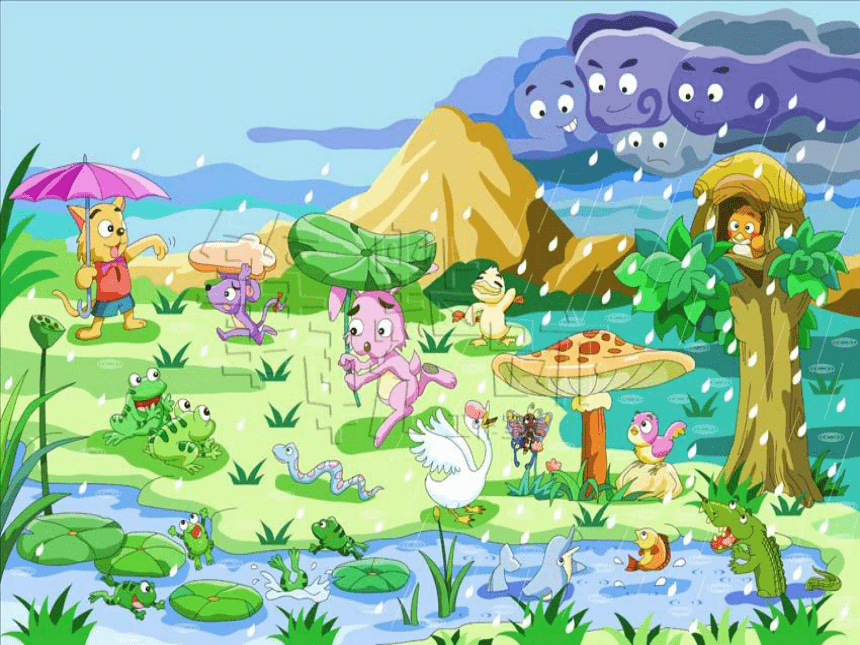
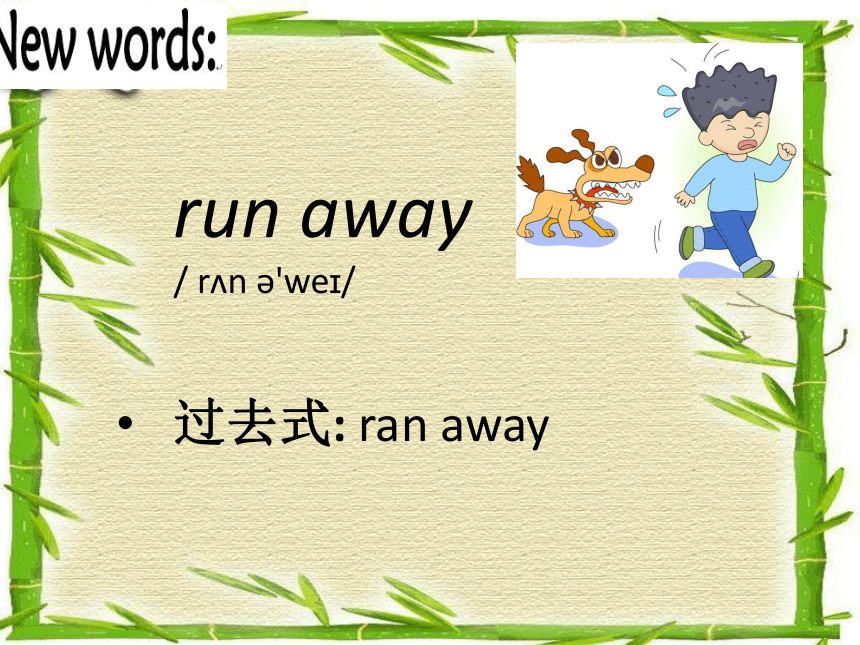
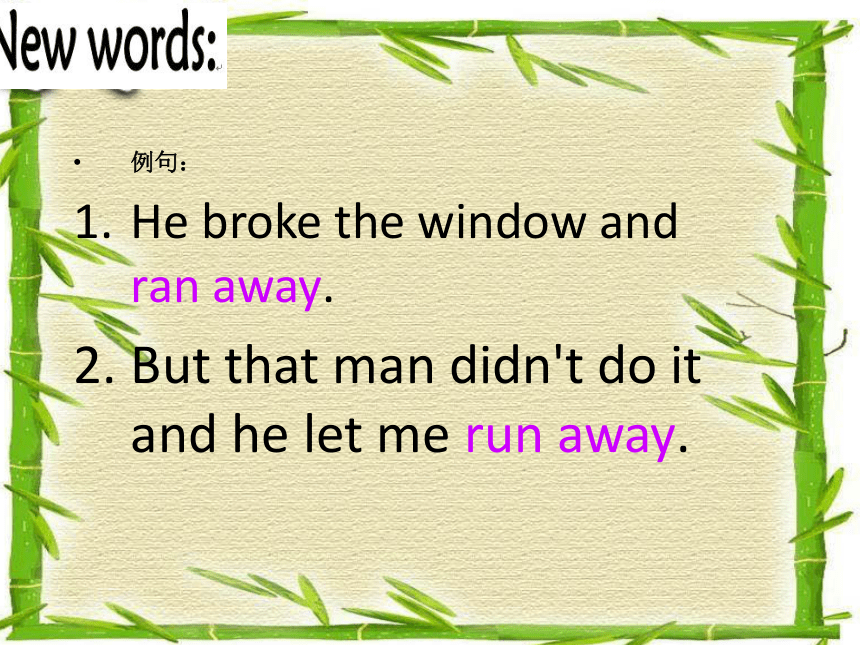
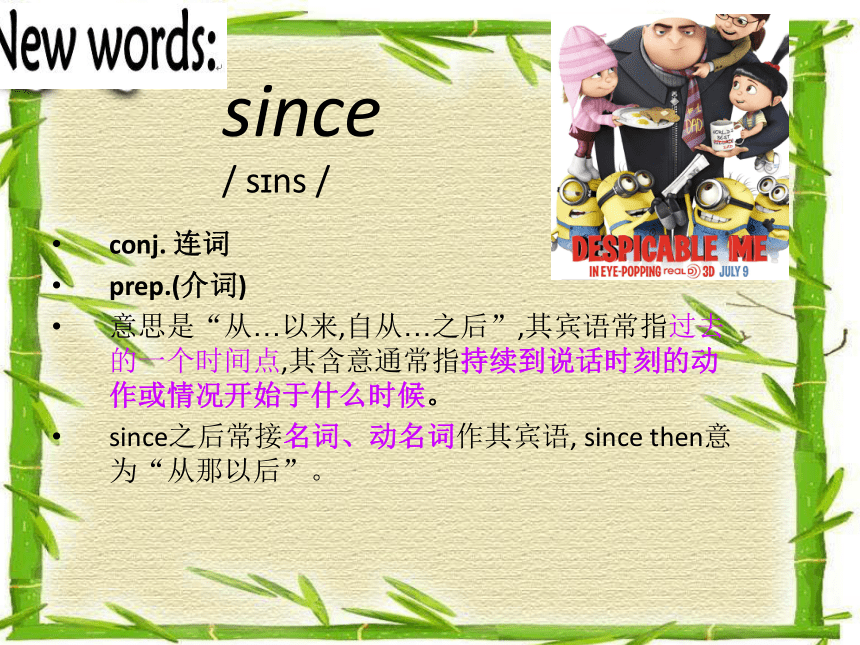
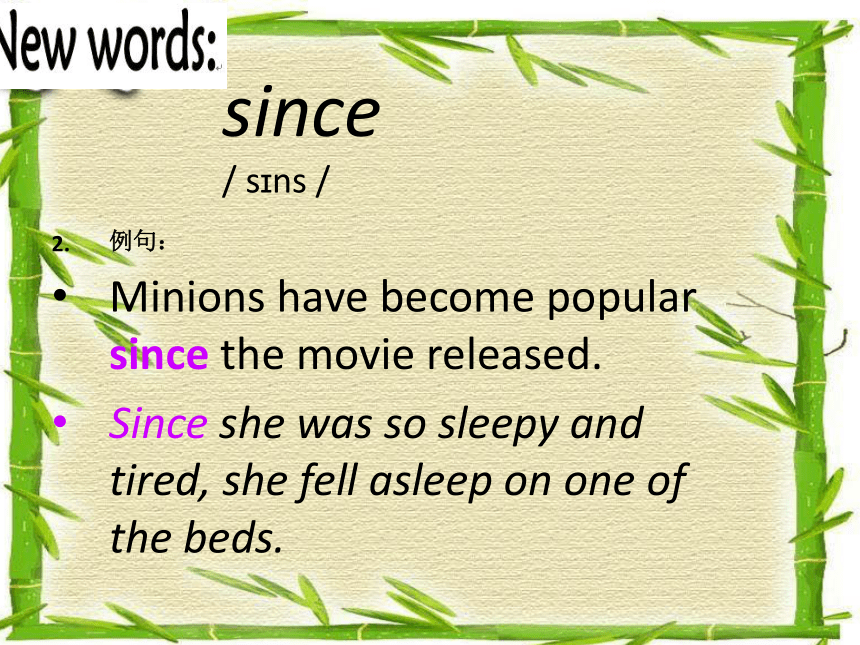

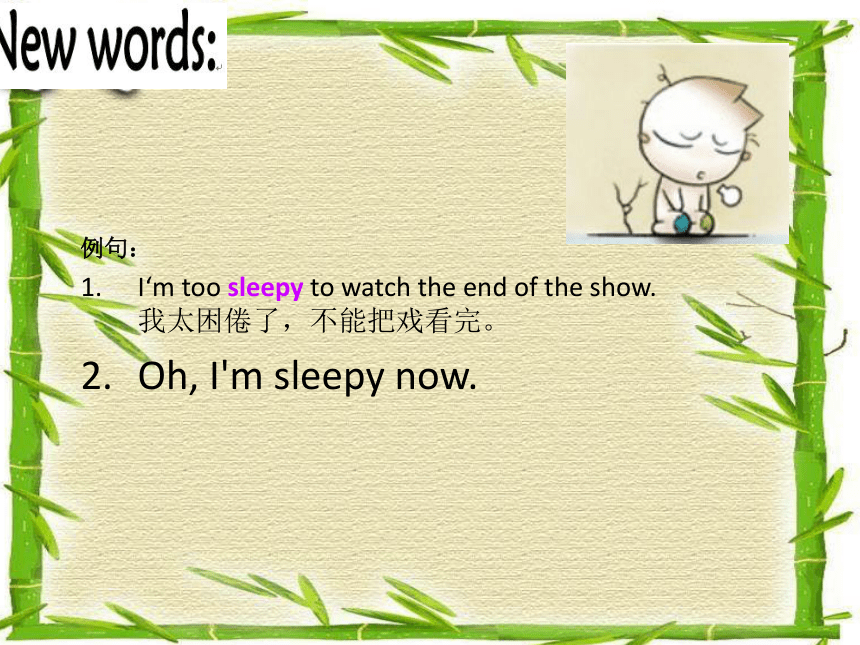
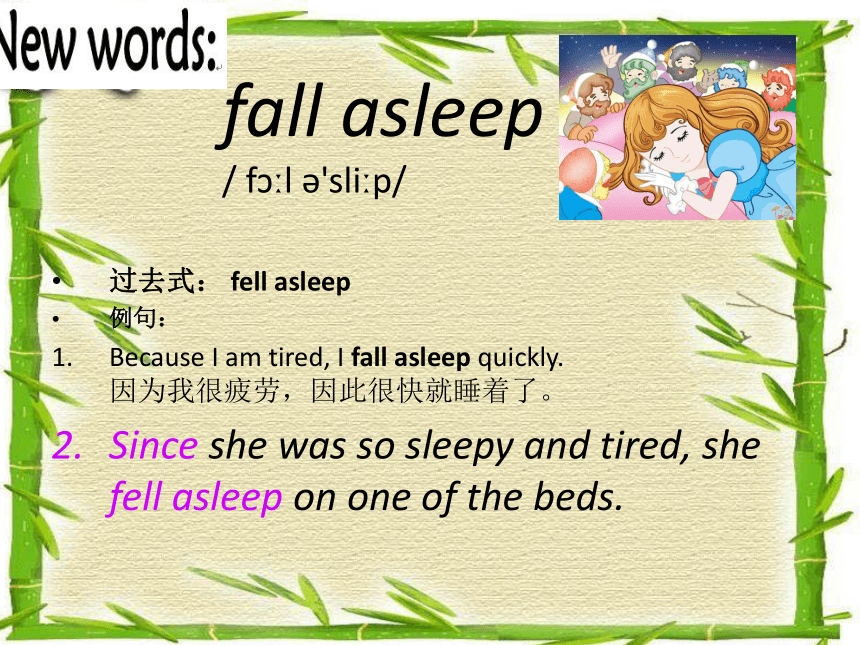
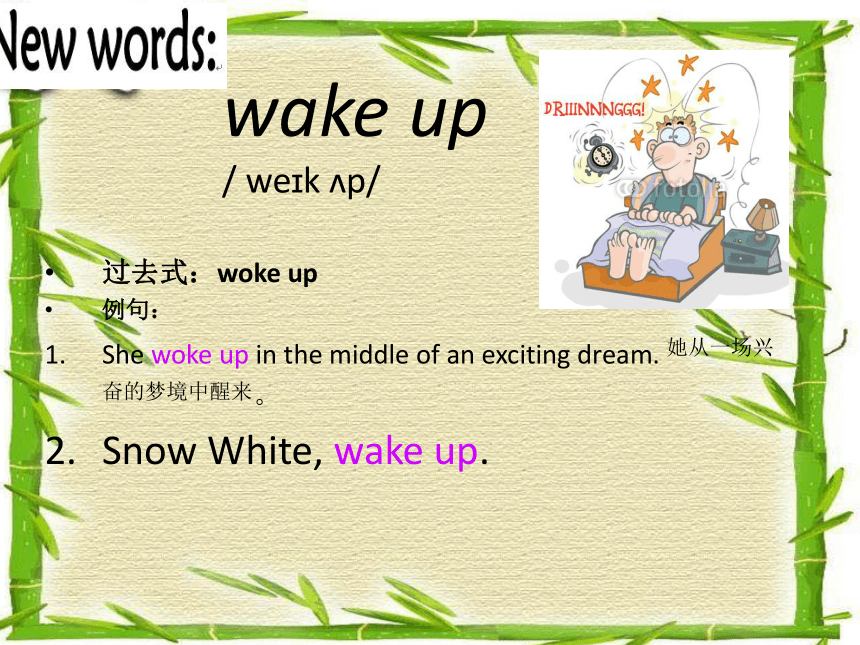


文档简介
课件64张PPT。Unit9 It's going to rain ,isn’t it? 要下雨了,是吗?
反意疑问句:
构成: 肯定的陈述句+否定的简略问句+?
否定的陈述句+肯定的简略问句+?
回答:用Yes或No
He isn't going to the zoo ,is he?
Yes,he is . 不,他要去。
No,he isn't. 是的,他不去。
run away / r?n ?'we?/ 过去式:?ran away
例句:
He broke the window and ran away.
But that man didn't do it and he let me run away. since / s?ns / conj. 连词
prep.(介词)
意思是“从…以来,自从…之后”,其宾语常指过去的一个时间点,其含意通常指持续到说话时刻的动作或情况开始于什么时候。
since之后常接名词、动名词作其宾语, since then意为“从那以后”。since / s?ns / 例句:
Minions have become popular since the movie released.
Since she was so sleepy and tired, she fell asleep on one of the beds.sleepy / 'sli?p? / feel sleepy 欲睡
sleepy asleep 这两个形容词均含有“欲睡的”之意。
sleepy:最常用词,指人昏昏欲睡,或沉睡时的寂静状态。
asleep:作表语,多用于非正式的英语指处于睡着的状态,侧重动作的结果。例句:
I‘m too?sleepy?to watch the end of the show. 我太困倦了,不能把戏看完。
Oh, I'm sleepy now. fall asleep / f??l ?'sli?p/ 过去式: fell asleep
例句:
Because I am tired, I?fall asleep?quickly. 因为我很疲劳,因此很快就睡着了。
Since she was so sleepy and tired, she fell asleep on one of the beds. wake up / we?k ?p/ 过去式:woke up
例句:
She woke up in the middle of an exciting dream. 她从一场兴奋的梦境中醒来。
Snow White, wake up. language / 'l??gw?d?/ language泛指“语言”时是不可数名词,在句中可用作定语。
language用来表示一个国家或民族具体的“语言文字”时,是可数名词,其前要加the
speak a language?讲一种语言
the spoken language?口语
the written language?书面语例句:
He speaks the French?language. ? 他讲法语。
Chinese is my native?language. 汉语是我的母语。dead / ded / V. die adj. dead n. death
dead与定冠词the连用可用作名词,表示“死者”。
dead在逻辑上已表示极限,故不能再用比较级和最高级。dead / ded / 例句:
1. He has been?dead?for two years. 他已死了两年。
2. Mary threw away the?dead?flowers. ? 玛丽把枯萎的花扔掉了。
prince / pr?ns / princess公主 Prince Charles查尔斯王子(英国王储)
例句:
There was once?a?prince?who?wished to?marry?a?princess;?but?then she?must be a?real?princess.??
从前有一位王子,他想找一位公主结婚,但她必须是一位真正的公主。prince / pr?ns / The magician metamorphosed?
the?frog?into?a?prince.??巫师将青蛙变成了王子
magician 英?[m?'d???n]
metamorphose
英?[?met?'m??f??z] put out / p?t a?t/ put out the fire 灭火
例句:
Far water does not?put out?near fire. [谚]远水救不了近火。
The boys?quickly?put?out?the?fire?with?water?and?an old?coat.??那些男孩很快地用水和旧外衣把火熄灭了。
He?put?out?his?cigarette.??他熄灭了香烟。dangerous / 'de?nd??r?s / dangerous for?对…有危险
dangerous for children?对儿童很危险
dangerous与in danger的区别在于:dangerous表示能够或可能造成危险的,指主体对外界有危害,而本身却未必有危险, in danger则是“(主体本身)处于危险状况”或“在危险中”的意思。例如:dangerous / 'de?nd??r?s / 例如:
The patient is in danger, he may die at any time.
The man is dangerous, he may kill any- body.
例句:
He is a?dangerous?person; keep away from him. ? 他是一个危险分子,离他远点。broken / 'br??k(?)n / adj.(形容词) broken不用于比较等级。
broken windows?破窗子
例句:
My watch is?broken. ? 我的表坏了。
Throw the?broken?cup away. ? 把那个破玻璃杯扔掉。horrible / 'h?r?b(?)l / ~+名词
horrible dress?难看的衣服
horrible weather?讨厌的天气
~+介词
horrible to sb?对某人不友好horrible / 'h?r?b(?)l / 例句:
This medicine tastes?horrible. ? 这种药难吃极了。
Will you stop making that?horrible?noise! 你别再弄出那种讨厌的响声来行不行。terrible / 'ter?b(?)l / ~+名词
terrible accident?可怕的事故
terrible war?可怕的战争
例句:terrible / 'ter?b(?)l / 例句:
The earthquake was a?terrible?catastrophe. 这次地震是个可怕的灾难。
A?terrible?accident happened on the highway yesterday. ? 昨天公路上发生了一起可怕的交通事故。terrible: 侧重指给人以长久的惊骇,极端的恐怖,令人难以忍受。
horrible: 指因骇人听闻的丑恶而令人毛骨悚然,着重厌恶的成分多于害怕。
例如:
A horrible sight met her eyes.一幅令人毛骨悚然的景象出现在她的眼前。
Nothing can erase from her mind the memory of that terrible day.没有什么东西可以消除她头脑里对那可怕的一天的记忆。
insect / '?nsekt / 昆虫是动物界中无脊椎动物的节肢动物门昆虫纲的动物,所有生物中种类及数量最多的一群,是世界上最繁盛的动物,已发现100多万种。insect / '?nsekt / 例句:
There are many kinds of?insects?in this area. ?这个地区有许多种昆虫。
A locust is a kind of destructive?insect. 蝗虫是一种害虫。You better watch out. You better not cry. You better not pout,
I'm telling you why: Santa Claus is coming to town!
He's making a list, checking it twice,
Gonna find out who's naughty or nice.
Santa Claus is coming to town!
He sees you when you're sleeping.He knows when you're awake. He knows if you've been bad or good. So be good for goodness sake. So you better watch out. You better not cry
You better not pout. I'm telling you why Santa Claus is comin' to town. Santa Claus is Coming to TownThe Story of Snow WhiteUseful expressions:
ask sb. to do sth. 叫某人做某事
In the forest 在森林里
run away 逃跑
fall asleep 睡着
one of + 名词复数 “其中之一”
wake sb. up 把某人弄醒
What a + 名词 :感叹句,“多么。。。”
(how + 形容词 )How to make rain?kettlepanice blocks
Tag Questions
反意疑问句5. There be 句型的反意疑问句1 There is a pen on the chair,___________? 2 There are 60 students in our class, _____________?
3 There was nothing in the fridge,_____________?
4 There will be a paper factory near my home in about 2 years,__________?isn’t therewas therewon’t therearen’t thereThere is/are/will be…, isn’t/aren’t/won’t there?6. 当陈述部分有never,seldom(很少), hardly(几乎不),few,little,nothing(没有) 等否定意义的词时,后面的反意疑问句则为肯定形式1.They have never visited his home, ___ ____ ? 2.There are few apples in the basket,___ ____?
3.He can hardly swim,____ _____?
4.It has no legs,_____ ______?
5.There is little water in the glass,____ _____?
6.They seldom很少 come late,_____ _____? are therecan hedoes itis theredo theyhave they7. 祈使句的反意疑问句1 Don’t be late, _____ ______? 2 Have a rest, _____ ______?
3 Speak louder, ______ _____?
4 Don’t wait for me, _____ ____?will you祈使句, will you ?will youwill youwill youLet’s have a rest, _____________?
(包括听话者)
Let us have a rest, _____________?
(不包括听话者)
will youshall we8. Let’s的反意疑问句shall weThey usually have a walk after supper,____________?don’t theyThere will be an exam soon,____________?won’t thereThere are few people in the street,
________?
A. aren’t there B. are there
C. are they D. aren’t theyBHe was hardly twelve then, ?
那时他还不到12岁吧,对吗? was he1. Linda went to the zoo three times last year ,__________?didn’t she2.This is your sister,_______________? isn’t she1)Tom is a worker, isn’t Tom?(找错)_______
2)You can swim, can not you?(找错)______
?
3)He had lunch, doesn’t he?(找错)________isn’t he ?can’t you ?didn’t he ?He has few friends in the school,
________?does he They have never been to the USA, _______________?have they It is a cow, ?
isn’t itYes, it is. They are pictures , ?aren’t theyYes, they are. You live in a small town , ?don’t youYes, I do.Lingming makes lots of friends, ? doesn’t he
Yes, he does. can heYes, he can.Beckham can ’t play football , ?You like rock music, ______?don’t youYes, I do./
No, I don’t.He never speaks English, _______?does heYes, he does.8. 你父母会游泳,是吗?
Your parents can swim, ____________?
9. 他们从来没有到过香港,是吗?
They __________________ Hong Kong,
______ they?
10. 你明天不上课,对吗?
You have ____ class tomorrow, ___
you?can’t theyhave never been tohavedo no8 You have never been to Beijing ,___________?
9 He didn’t say anything about your mistakes, __________?
10 Tom can swim very well, __________?
11 All of your friends will come to your party, ___________?
12 There is a pen on the chair,___________? 13 There is nothing in the fridge,_____________?
14 There will be a paper factory near my home in about 2 years,__________?
15 Open your books, ____________?
16 Don’t go across the road now, ___________?
17 Let’s wait ,__________?
18 Let us have a rest, _____________?have youdid hecan’t hewon’t theyisn’t thereis therewon’t therewill youwill youshall wewill youYou are listening to me, _______________?
You go to school from Monday to Friday, ________?
He didn’t go to school late this morning, _______?
You have never been to Shanghai, __________?
There are 60 Students in our class, _____________?aren’t youdon’t you did hehave youaren’t there2.You have no class tomorrow, do you?
3.He was hardly twelve then, was he?5.在回答反意疑问句时,要注意英汉两种语言习惯的差别。
注意语调:
询问问题用升调,核对信息用降调。例:1.They have never visited his home, have they?反意疑问句一、陈述句(肯定式) + 疑问部分(否定式)?
be动词(is, are, was, were)的句型:
2. 一般动词(play, study, watch 等)句型:
3. 情态动词(can, will)的反意疑问句
4. 完成时的反意疑问句现在 主语+is (are)…, isn’t (aren’t) + 主语?
过去 主语+was (were)…,wasn’t (weren’t) + 主语?现在 主语+play/plays…, don’t (doesn’t) + 主语?
过去 主语+played…, didn’t + 主语? 现在 主语+can/will …, can’t /won’t + 主语?主语+have/has+过去分词…, haven’t (hasn’t) + 主语? 结构一: 前肯,+ 后否
Be 动词:
1. You are an actor, ________ _____ ?
2. He is a good boy, ________ ______ ?
3. It was fine yesterday, _______ ___ ?
5. She is going to visit me, _____ ____?
aren’t you isn’t he wasn’t it isn’t she行为动词:
1. It often rains here, ________ ___ ?
2. He likes soccer, _________ ____ ?
3. You have a headache, _______ ___ ?
4. I called you yesterday, _______ __?
其它动词:
1. You will go to America, ______ ___ ?
doesn’t it doesn’t he don’t you didn’t I won’t you 结构二: 前否,+ 后肯
1. You aren’t an actor, ______ ____ ?
2. He isn’t a good boy, ______ _____ ?
3. It wasn’t fine yesterday, ____ ____ ?
4. It doesn’t rain here, ______ ____ ?
5. His sister doesn’t have a headache,
________ _____ ?
6. You didn’t call me yesterday,
_______ _____? are you is hedoes itdoes she was itdid you7. You won’t go to U.S.A., ______ ____?
8. There isn’t a boy in our classroom,
______ _______ ?
9. There weren’t many cars in the street,
_______ _______ ?
10. Don’t smoke, _______ _____ ?will youis therewere therewill you反意疑问句要注意的要点1.Your classmates like you,don’t
they?反意疑问句的主语必须用人称代词,且
要与前一句的人称数一致。2.You are a student, aren’t you?
He goes home, doesn’t he?反意疑问句的否定式要用缩写形势注意语调:
询问问题用升调,核对信息用降调。3. He can’t come tonight, can he?
You aren’t a teacher, are you?
She went home, didn’t she?反意疑问句的动词要与陈述句一致 be/助动词/ 情态动词4.You were not at home, were you?
Lily is watching TV, is she?
He will come, won’t he?反意疑问句的时态要一致5.She has never seen you, ______?has she*若句中出现有never, seldom, little,
few 等副词时,反意疑问句要用肯定其他特殊反意疑问句:1.There is some milk in the cup,
isn’t there? there be 句型的反意疑问句还是用
there be1. 她不喜欢流行音乐,是吗?
She _________ like pop music,
____________?
2. 你听说过他,对吗?
You _____________of him,
______________?
3. 他是德国人,是吗?
He was German, ____________?练练吧!doesn’tdoes shehave heardhaven’t youwasn’t he
反意疑问句:
构成: 肯定的陈述句+否定的简略问句+?
否定的陈述句+肯定的简略问句+?
回答:用Yes或No
He isn't going to the zoo ,is he?
Yes,he is . 不,他要去。
No,he isn't. 是的,他不去。
run away / r?n ?'we?/ 过去式:?ran away
例句:
He broke the window and ran away.
But that man didn't do it and he let me run away. since / s?ns / conj. 连词
prep.(介词)
意思是“从…以来,自从…之后”,其宾语常指过去的一个时间点,其含意通常指持续到说话时刻的动作或情况开始于什么时候。
since之后常接名词、动名词作其宾语, since then意为“从那以后”。since / s?ns / 例句:
Minions have become popular since the movie released.
Since she was so sleepy and tired, she fell asleep on one of the beds.sleepy / 'sli?p? / feel sleepy 欲睡
sleepy asleep 这两个形容词均含有“欲睡的”之意。
sleepy:最常用词,指人昏昏欲睡,或沉睡时的寂静状态。
asleep:作表语,多用于非正式的英语指处于睡着的状态,侧重动作的结果。例句:
I‘m too?sleepy?to watch the end of the show. 我太困倦了,不能把戏看完。
Oh, I'm sleepy now. fall asleep / f??l ?'sli?p/ 过去式: fell asleep
例句:
Because I am tired, I?fall asleep?quickly. 因为我很疲劳,因此很快就睡着了。
Since she was so sleepy and tired, she fell asleep on one of the beds. wake up / we?k ?p/ 过去式:woke up
例句:
She woke up in the middle of an exciting dream. 她从一场兴奋的梦境中醒来。
Snow White, wake up. language / 'l??gw?d?/ language泛指“语言”时是不可数名词,在句中可用作定语。
language用来表示一个国家或民族具体的“语言文字”时,是可数名词,其前要加the
speak a language?讲一种语言
the spoken language?口语
the written language?书面语例句:
He speaks the French?language. ? 他讲法语。
Chinese is my native?language. 汉语是我的母语。dead / ded / V. die adj. dead n. death
dead与定冠词the连用可用作名词,表示“死者”。
dead在逻辑上已表示极限,故不能再用比较级和最高级。dead / ded / 例句:
1. He has been?dead?for two years. 他已死了两年。
2. Mary threw away the?dead?flowers. ? 玛丽把枯萎的花扔掉了。
prince / pr?ns / princess公主 Prince Charles查尔斯王子(英国王储)
例句:
There was once?a?prince?who?wished to?marry?a?princess;?but?then she?must be a?real?princess.??
从前有一位王子,他想找一位公主结婚,但她必须是一位真正的公主。prince / pr?ns / The magician metamorphosed?
the?frog?into?a?prince.??巫师将青蛙变成了王子
magician 英?[m?'d???n]
metamorphose
英?[?met?'m??f??z] put out / p?t a?t/ put out the fire 灭火
例句:
Far water does not?put out?near fire. [谚]远水救不了近火。
The boys?quickly?put?out?the?fire?with?water?and?an old?coat.??那些男孩很快地用水和旧外衣把火熄灭了。
He?put?out?his?cigarette.??他熄灭了香烟。dangerous / 'de?nd??r?s / dangerous for?对…有危险
dangerous for children?对儿童很危险
dangerous与in danger的区别在于:dangerous表示能够或可能造成危险的,指主体对外界有危害,而本身却未必有危险, in danger则是“(主体本身)处于危险状况”或“在危险中”的意思。例如:dangerous / 'de?nd??r?s / 例如:
The patient is in danger, he may die at any time.
The man is dangerous, he may kill any- body.
例句:
He is a?dangerous?person; keep away from him. ? 他是一个危险分子,离他远点。broken / 'br??k(?)n / adj.(形容词) broken不用于比较等级。
broken windows?破窗子
例句:
My watch is?broken. ? 我的表坏了。
Throw the?broken?cup away. ? 把那个破玻璃杯扔掉。horrible / 'h?r?b(?)l / ~+名词
horrible dress?难看的衣服
horrible weather?讨厌的天气
~+介词
horrible to sb?对某人不友好horrible / 'h?r?b(?)l / 例句:
This medicine tastes?horrible. ? 这种药难吃极了。
Will you stop making that?horrible?noise! 你别再弄出那种讨厌的响声来行不行。terrible / 'ter?b(?)l / ~+名词
terrible accident?可怕的事故
terrible war?可怕的战争
例句:terrible / 'ter?b(?)l / 例句:
The earthquake was a?terrible?catastrophe. 这次地震是个可怕的灾难。
A?terrible?accident happened on the highway yesterday. ? 昨天公路上发生了一起可怕的交通事故。terrible: 侧重指给人以长久的惊骇,极端的恐怖,令人难以忍受。
horrible: 指因骇人听闻的丑恶而令人毛骨悚然,着重厌恶的成分多于害怕。
例如:
A horrible sight met her eyes.一幅令人毛骨悚然的景象出现在她的眼前。
Nothing can erase from her mind the memory of that terrible day.没有什么东西可以消除她头脑里对那可怕的一天的记忆。
insect / '?nsekt / 昆虫是动物界中无脊椎动物的节肢动物门昆虫纲的动物,所有生物中种类及数量最多的一群,是世界上最繁盛的动物,已发现100多万种。insect / '?nsekt / 例句:
There are many kinds of?insects?in this area. ?这个地区有许多种昆虫。
A locust is a kind of destructive?insect. 蝗虫是一种害虫。You better watch out. You better not cry. You better not pout,
I'm telling you why: Santa Claus is coming to town!
He's making a list, checking it twice,
Gonna find out who's naughty or nice.
Santa Claus is coming to town!
He sees you when you're sleeping.He knows when you're awake. He knows if you've been bad or good. So be good for goodness sake. So you better watch out. You better not cry
You better not pout. I'm telling you why Santa Claus is comin' to town. Santa Claus is Coming to TownThe Story of Snow WhiteUseful expressions:
ask sb. to do sth. 叫某人做某事
In the forest 在森林里
run away 逃跑
fall asleep 睡着
one of + 名词复数 “其中之一”
wake sb. up 把某人弄醒
What a + 名词 :感叹句,“多么。。。”
(how + 形容词 )How to make rain?kettlepanice blocks
Tag Questions
反意疑问句5. There be 句型的反意疑问句1 There is a pen on the chair,___________? 2 There are 60 students in our class, _____________?
3 There was nothing in the fridge,_____________?
4 There will be a paper factory near my home in about 2 years,__________?isn’t therewas therewon’t therearen’t thereThere is/are/will be…, isn’t/aren’t/won’t there?6. 当陈述部分有never,seldom(很少), hardly(几乎不),few,little,nothing(没有) 等否定意义的词时,后面的反意疑问句则为肯定形式1.They have never visited his home, ___ ____ ? 2.There are few apples in the basket,___ ____?
3.He can hardly swim,____ _____?
4.It has no legs,_____ ______?
5.There is little water in the glass,____ _____?
6.They seldom很少 come late,_____ _____? are therecan hedoes itis theredo theyhave they7. 祈使句的反意疑问句1 Don’t be late, _____ ______? 2 Have a rest, _____ ______?
3 Speak louder, ______ _____?
4 Don’t wait for me, _____ ____?will you祈使句, will you ?will youwill youwill youLet’s have a rest, _____________?
(包括听话者)
Let us have a rest, _____________?
(不包括听话者)
will youshall we8. Let’s的反意疑问句shall weThey usually have a walk after supper,____________?don’t theyThere will be an exam soon,____________?won’t thereThere are few people in the street,
________?
A. aren’t there B. are there
C. are they D. aren’t theyBHe was hardly twelve then, ?
那时他还不到12岁吧,对吗? was he1. Linda went to the zoo three times last year ,__________?didn’t she2.This is your sister,_______________? isn’t she1)Tom is a worker, isn’t Tom?(找错)_______
2)You can swim, can not you?(找错)______
?
3)He had lunch, doesn’t he?(找错)________isn’t he ?can’t you ?didn’t he ?He has few friends in the school,
________?does he They have never been to the USA, _______________?have they It is a cow, ?
isn’t itYes, it is. They are pictures , ?aren’t theyYes, they are. You live in a small town , ?don’t youYes, I do.Lingming makes lots of friends, ? doesn’t he
Yes, he does. can heYes, he can.Beckham can ’t play football , ?You like rock music, ______?don’t youYes, I do./
No, I don’t.He never speaks English, _______?does heYes, he does.8. 你父母会游泳,是吗?
Your parents can swim, ____________?
9. 他们从来没有到过香港,是吗?
They __________________ Hong Kong,
______ they?
10. 你明天不上课,对吗?
You have ____ class tomorrow, ___
you?can’t theyhave never been tohavedo no8 You have never been to Beijing ,___________?
9 He didn’t say anything about your mistakes, __________?
10 Tom can swim very well, __________?
11 All of your friends will come to your party, ___________?
12 There is a pen on the chair,___________? 13 There is nothing in the fridge,_____________?
14 There will be a paper factory near my home in about 2 years,__________?
15 Open your books, ____________?
16 Don’t go across the road now, ___________?
17 Let’s wait ,__________?
18 Let us have a rest, _____________?have youdid hecan’t hewon’t theyisn’t thereis therewon’t therewill youwill youshall wewill youYou are listening to me, _______________?
You go to school from Monday to Friday, ________?
He didn’t go to school late this morning, _______?
You have never been to Shanghai, __________?
There are 60 Students in our class, _____________?aren’t youdon’t you did hehave youaren’t there2.You have no class tomorrow, do you?
3.He was hardly twelve then, was he?5.在回答反意疑问句时,要注意英汉两种语言习惯的差别。
注意语调:
询问问题用升调,核对信息用降调。例:1.They have never visited his home, have they?反意疑问句一、陈述句(肯定式) + 疑问部分(否定式)?
be动词(is, are, was, were)的句型:
2. 一般动词(play, study, watch 等)句型:
3. 情态动词(can, will)的反意疑问句
4. 完成时的反意疑问句现在 主语+is (are)…, isn’t (aren’t) + 主语?
过去 主语+was (were)…,wasn’t (weren’t) + 主语?现在 主语+play/plays…, don’t (doesn’t) + 主语?
过去 主语+played…, didn’t + 主语? 现在 主语+can/will …, can’t /won’t + 主语?主语+have/has+过去分词…, haven’t (hasn’t) + 主语? 结构一: 前肯,+ 后否
Be 动词:
1. You are an actor, ________ _____ ?
2. He is a good boy, ________ ______ ?
3. It was fine yesterday, _______ ___ ?
5. She is going to visit me, _____ ____?
aren’t you isn’t he wasn’t it isn’t she行为动词:
1. It often rains here, ________ ___ ?
2. He likes soccer, _________ ____ ?
3. You have a headache, _______ ___ ?
4. I called you yesterday, _______ __?
其它动词:
1. You will go to America, ______ ___ ?
doesn’t it doesn’t he don’t you didn’t I won’t you 结构二: 前否,+ 后肯
1. You aren’t an actor, ______ ____ ?
2. He isn’t a good boy, ______ _____ ?
3. It wasn’t fine yesterday, ____ ____ ?
4. It doesn’t rain here, ______ ____ ?
5. His sister doesn’t have a headache,
________ _____ ?
6. You didn’t call me yesterday,
_______ _____? are you is hedoes itdoes she was itdid you7. You won’t go to U.S.A., ______ ____?
8. There isn’t a boy in our classroom,
______ _______ ?
9. There weren’t many cars in the street,
_______ _______ ?
10. Don’t smoke, _______ _____ ?will youis therewere therewill you反意疑问句要注意的要点1.Your classmates like you,don’t
they?反意疑问句的主语必须用人称代词,且
要与前一句的人称数一致。2.You are a student, aren’t you?
He goes home, doesn’t he?反意疑问句的否定式要用缩写形势注意语调:
询问问题用升调,核对信息用降调。3. He can’t come tonight, can he?
You aren’t a teacher, are you?
She went home, didn’t she?反意疑问句的动词要与陈述句一致 be/助动词/ 情态动词4.You were not at home, were you?
Lily is watching TV, is she?
He will come, won’t he?反意疑问句的时态要一致5.She has never seen you, ______?has she*若句中出现有never, seldom, little,
few 等副词时,反意疑问句要用肯定其他特殊反意疑问句:1.There is some milk in the cup,
isn’t there? there be 句型的反意疑问句还是用
there be1. 她不喜欢流行音乐,是吗?
She _________ like pop music,
____________?
2. 你听说过他,对吗?
You _____________of him,
______________?
3. 他是德国人,是吗?
He was German, ____________?练练吧!doesn’tdoes shehave heardhaven’t youwasn’t he
同课章节目录
- Unit 1 What's your favourite season?
- Unit 2 Being happy all year round.
- Unit 3 What are you good at?
- Unit 4 Lets go for a walk
- Unit 5 Maths Problems
- Unit 6 How tall are you?
- Unit 7 What did you do last weekend?
- Unit 8 Science makes our life easy!
- Unit 9 It's going to rain, isn't it?
- Unit 10 Guess:What was happening at about 1:30 yes
- Unit 11 Will you come to our English party?
- Unit 12 Always something interesting and nice to r
- Unit 13 Our beautiful environment
- Unit 14 Everything is fun.
- Unit 15 Yesterday,todayand tomorrow.
